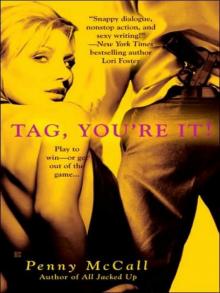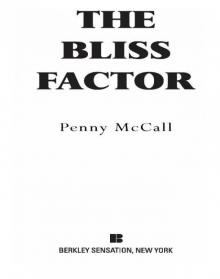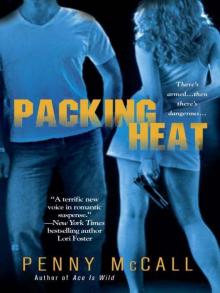- Home
- Penny McCall
The Bliss Factor Page 3
The Bliss Factor Read online
Page 3
“Still reading my mind?”
“Reliving my own childhood,” Annie said.
Rae smiled faintly. “So, let me get this straight, that fight wasn’t staged.”
“No.”
The answer came from Conn, but she kept her eyes on her mother’s face, which, surprise, was the safer way to go. “And you want me to take him home with me, so the bad guys will come after me, too?”
“We wouldn’t ask you to take him in if it wasn’t safe.”
True, but her mother’s version of safe and her version of safe were two different things. Annie might choose to think the best of Connor Larkin, but Rae wasn’t getting the warm fuzzies from him. Volcanic eruption was too mild a description for what she felt when she looked at Connor Larkin. And then there were the Captain Jack Sparrow wannabes to worry about.
“He really does need your help,” Annie insisted. “He’s not safe here.”
“What makes you think he’ll be safe at my house? Not to mention me?”
“For one thing they weren’t actually trying to kill him,” her father said. “They had plenty of time to finish him off and they didn’t. Second, they won’t know he’s at your house. Or where your house is. Or even who you are.”
“How do you arrive at that conclusion?”
“Because you changed your name, and lived at college for four years before relocating here to get your CPA. Because there’s no way to connect Rae Blissfield with Annie and Nelson Bliss. Your birth certificate isn’t a part of your college record, and I doubt the tiny town where it was registered has converted to electronic record-keeping.”
“It sounds like you’ve thought all this through.” To back her into a corner. “But the people you travel with—”
“None of them will talk.”
She knew her father was right. “But—”
“They’ll just think he took off.”
“They who?”
Annie shrugged. So did Nelson.
Rae steeled herself and turned to Conn. “I don’t suppose you know who’s after you?”
“Brigands,” he said with a perfectly straight face. “Lawless mercenaries.”
“Why do they want to harm you?”
“ ’Tis a mystery, milady.” But he grinned. “Perhaps my skill with the gentler sex annoys them.”
She rolled her eyes. “Cut the Knights of the Roundtable act.”
He drew himself up, as far as he could with a low ceiling cramping his style. “I am not a knight, I am an armorer, and far superior as my skill with a hammer and forge protects their very lives.”
“O-kay.” Rae got to her feet, her father headed her off before she could try for the door again.
He shooed her down the narrow hallway, crowding her back so she had nowhere to go but into the bedroom at the end of the RV. Rae managed to completely ignore the rumpled double bed.
“You told me he had amnesia,” she said, keeping her voice down and shooting King Arthur’s tailor a quick glance over her father’s shoulder to make sure he couldn’t hear them. “This guy is delusional. He thinks he’s actually from the Middle Ages.”
“Rae—”
“Either he’s crazy or he’s doing it to tick me off, which, since he wants my help, is not very smart.”
“It’s not an act,” Nelson insisted in a harsh whisper. “Somebody whacked him over the head about a week ago, hard. The blow would have killed anyone else.”
“I’m not surprised. He strikes me as a guy with a hard head.” But she stopped trying to get by her father, and he relaxed, too.
“When he woke up, he thought he actually was an armorer.”
“As in sixteenth-century England, indentured-to-the-lord-of-the-castle armorer?”
“Yep.”
“He doesn’t have an English accent.”
“Neither does anyone else.”
Right, so he thought he didn’t have an accent at all. That actually made sense. In an alternate universe sort of way. “There aren’t any castles, let alone lords,” Rae said, “and people don’t ride horses or wear period dress—well, normal people.”
“He hasn’t left the faire grounds since he lost his memory. It’s odd, really. He sees the tourists dressed in modern clothing but it doesn’t seem to shatter his belief in who he thinks he is. The doctor said—”
“Wait a minute.” Rae put her hand on Nelson’s arm. “You took him to a doctor?”
“No, but we called Mutch the Court Jester’s cousin. She’s a doctor in Philadelphia.”
“What did Mutch the Court Jester’s cousin say?” Rae asked, shaking her head a little because she didn’t find any part of that question strange.
“That it’s probably a defense mechanism.”
“A defense mechanism that’s likely to get him killed. Or at least hurt again.”
“It’s not about his physical safety,” Nelson said. “There might have been some emotional stress in his life before the injury that caused him to . . . check out for a little while. Or it could be a result of the blow, short-circuiting his long-term memory so that all he knows is the re-enacting but he doesn’t remember it’s a pretense. That would explain why the throngs of tourists don’t seem incongruous to him.”
“But his memory will come back, right?”
“A blow to the head can cause memory loss of indeterminate severity and indefinite duration,” he said, clearly repeating word for word what he’d been told. “That didn’t sound very hopeful, so we looked it up on the Internet—iPhone, remember?”
That Rae found strange.
“There’s no specific set of symptoms for amnesia,” Nelson continued. “Conn could’ve lost short-term or long-term memory, or a combination of both, and there’s no telling how long it will be before it comes back. But it will come back. It’s just a matter of time, and the doctor didn’t think it would take very long. When it does come back, and he can remember who’s after him, he won’t need our help anymore.”
Rae let it all sink in, glancing over her shoulder at Conn, who was staring at her. And looking harmless, for all his bulging muscles and oozing sexuality.
“He seems to be okay with the amnesia,” Nelson said. “Curious about everything, but very laid back and accepting.”
“What was he like before?”
“Less laid back, but still very nice. He’s a good guy.”
“He’s a nutcase.” And if she was crazy enough to get involved they might as well put her in the rubber room next to his.
Her parents might choose to believe everything would work out for the best, and she figured Conn’s memory would come back, too. But all you had to do was read the newspaper to know that he might not get it all back, especially the part where he was attacked. “Why don’t you call the police?”
“No!”
“I know you object to authority, Dad, but—”
“It’s not that. I . . . I can’t explain. Just promise me you won’t call the police. Please, Sunny,” he pressed when she didn’t immediately agree. “We wouldn’t ask you if it wasn’t important, and we wouldn’t send him to stay with you if it meant putting you in danger.”
There were all kinds of danger, she thought, glancing back again to find Conn staring at her backside. And the worst kind was the danger you wanted to throw yourself into. Without any regard for the consequences.
“OH MY GOD, YOU’RE DRIVING A HUMMER?” ANNIE Bliss said when Rae parked the tank of a vehicle next to her parents’ old Airstream trailer, which didn’t look much larger. “Do you know how much fossil fuel these things burn? Do you realize what this is doing to the ice caps?”
“No idea,” Rae said, listening to the Hummer suck up enough gas, even at idle, to light a third-world country, and refusing to deplore the waste of energy. Not that she subscribed to rampant, thoughtless consumerism, but it would be nice, for once, to feel like she was exercising her own opinion rather than doing a watered-down imitation of Annie Bliss, Crusader for all Worthy Causes. “Just be grat
eful my Jaguar was in the shop this week and they chose to saddle me with this thing.”
“Jaguar,” her mother said, sounding only slightly less disgusted than she’d been when confronted with the Hummer. “Why couldn’t you buy a nice hybrid car?”
Right, like tall, dark, and forgetful would have fit into one of those any better than he would the Jag. And why was she suddenly making automotive judgments based on an overgrown fairy-tale character? “I have a sudden urge to go hybrid shopping right now,” she said.
Annie frowned at her, but there might have been a smile tugging at the corners of her mouth. “It’s best if Conn isn’t seen getting into your gas-guzzling monstrosity. Just be ready to go,” she finished and, when Nelson all but shoved Larkin out of the trailer, she wrenched the passenger door open and propelled him toward it, using his own momentum.
Rae made the mistake of looking over right when his big body filled the door. He’d changed into a dark blue T-shirt and jeans, and not the saggy, baggy kind of jeans, either. These weren’t unfashionably tight, but they were well-worn and molded to his long legs and lean hips. Her knees went weak just at the idea of having that big, hard body, not to mention that mouth, barely inches away. Her foot slipped off the brake pedal, the Hummer lurched forward just as Larkin was ducking inside, and the door frame impacted his skull with an audible crack.
He fell on his butt, one large hand cradling the side of his head. Rae shot the Hummer into park, her heart so high in her throat she could barely breathe.
“Are you all right?” Annie asked, looking around nervously and pulling at his arm as if she had even a remote chance of heaving his bulk out of the dirt.
“I’m so sorry,” Rae said, bracing her hands on the passenger seat so she could look down at him, while genuine concern and impossible hope chased each other around her brain. Hope won. Fueled by desperation. “Maybe he got his memory back,” she said to her mother. “You know, a second blow—”
“That only works in the movies,” Annie said.
“What day is it?” Rae asked him anyway.
“The same day it was a moment ago,” he said with a slight, one-shouldered shrug. “What matter if it be today or tomorrow or yestere’en?”
“Today somebody tried to kill you,” Rae reminded him. “Yestere’en, too, as a matter of fact. I’m hoping tomorrow you’ll get your memory back and figure out who so you can deal with it, and I can get on with my life.”
He grinned full out. Rae’s already weak knees started to tremble, along with several other strategic regions of her body, and she began to think Connor Larkin should worry less about the aggression of strangers and more about her.
“I look forward to seeing your castle,” Larkin said. “I will strive to be of service to you.”
And that was the point where Rae knew she was doomed because her brain understood what he was saying but her body gave the word servicea whole other interpretation. And then her imagination supplied pictures. If she got that hot just thinking about having sex with him, Larkin wouldn’t make it one night in her house before she asked him to demonstrate just how handy he could be. Considering the fact that he’d kissed her when she was a complete stranger, she doubted he’d turn her away.
She looked at her mother.
“You promised,” Annie said before Rae could even form the word “no,” let alone draw the breath to say it. Annie tossed a canvas duffel into the backseat, adding, “And it wouldn’t be the worst thing for you.”
“Mom!”
“Take some of the starch out of your spine.”
If he did for her spine what he’d done for her knees, she’d be flat on her back for the next week, and at some point she’d invite him to join her. And then the inconvenience of having him around would be notched up to serious potential for disaster. She wasn’t a casual-sex kind of woman, and no way was she falling for someone who lived his kind of gypsy lifestyle.
“Dad,” she said, feeling like her whole world was hanging on this one decision.
“We wouldn’t ask you if there was another way,” Nelson said.
Rae took a deep breath—and caught a big whiff of Connor Larkin. Soap, man, a touch of sweat, and just enough wood smoke from his forge, like a hint of danger that made the combination irresistible. If they bottled his scent and made it available to normal men, the women of the world would be in real trouble. She exhaled through her mouth, shutting her eyes for good measure.
Her parents rarely asked her for favors. Most of the time she was trying to get them to follow enough rules so the IRS or local law enforcement didn’t come after them. They really didn’t want more than a little of her time, and when it was her father appealing to her . . . If this guy, Larkin, was the cause of his distress then she’d damn well get him out of there. And take him straight to the police, because she didn’t for a second believe his cockamamie story.
“Fine,” she said to Larkin. “Come on.”
He grinned again. This time she had the presence of mind to look away. It was harder to ignore the way his deep voice made her shiver. His words didn’t help, either.
“I look forward to our time together,” he said.
“Just get in,” she said with a heavy sigh.
But he only stood there, staring at the Hummer, having the typical male reaction to a piece of monstrous equipment that would have been complete overkill for a mountain trail in Nepal, let alone a paved road in Michigan. He circled the shiny black vehicle, pausing to study the chrome grille with a slightly dazed look on his face.
“Come on, Hercules, let’s go,” Rae yelled out her window before he asked her to pop the hood—or whatever the sixteenth-century equivalent of that phrase might be.
He climbed into the Hummer with an ease she envied, and said, “Hercules is a Greek myth.”
“And it doesn’t strike you as odd that a medieval armorer would know who and what Hercules is?”
“I must have heard the tale as a child,” he said without missing a beat. “I’m looking forward to our journey. I have never been away from the gathering place.”
Rae shook her head, put the Hummer in gear, and motored away from the Airstream, waving good-bye to her parents and trying not to notice Connor Larkin sitting next to her, so big his shoulder was practically brushing hers. And he kept looking over at her. She didn’t have to see him to know he was doing it because every time his eyes landed on her it felt like his hands did, too. And his mouth, and . . . “Stop it,” she said.
“Stop what?”
“Looking at me.”
“I assumed you desired my regard.”
“Why would you assume that?”
“You dress in provocative clothing, you paint your face. If you let your hair down . . .” He caught a loose tendril, his fingers brushing the side of her neck.
She almost drove the Hummer off the side of the dirt road leading out of Holly Grove, and she missed most of the rest of his comment. She got his drift, though. “Let’s get a couple things straight,” she said, muscling the vehicle back into the slow-moving stream of departing revelers. “First, keep your hands to yourself. And second, I’m not going to be saddled with you long enough for hair-style to be an issue.”
“Saddled,” he said, his voice dropping another impossible octave. “An interesting turn of phrase. It brings to mind riding.”
“It brings to mind an unwelcome burden.” But she reached over and cranked up the air conditioning.
She made the turn onto Dixie Highway, four lanes of road winding through fields and small towns, heading toward I-75 and normalcy. Except for six-odd feet of crazy sitting in the passenger seat. “It would help if you’d tell me what’s really going on so I know my parents aren’t in any trouble,” she said.
“Annie and Nelson are perfectly safe, as are you.”
“Not as long as you’re keeping secrets.”
“I would reveal the blackguards if I could but remember their names,” he said, sounding solemn and earnest, and co
mpletely serious about not only the answer he gave, but the way he gave it.
“So you’re sticking with the amnesia story.”
“ ’ Tis a choice I make most unwillingly.”
Rae wanted to roll her eyes, but she didn’t. Connor Larkin used the ridiculous and hackneyed Renaissance faire jargon, but he did it without the overdone English accent. From the people in Holly Grove it was just plain cheesy. He managed to make it sound completely natural. Either he was a really good actor or he believed his own improbable story. And what rational adult would choose to live the part of a bad re-enactor?
A man who had something to hide, that’s who. So what if he did a good job of selling his shtick, that didn’t mean she had to buy it. Even if he seemed harmless, the guys who’d attacked him weren’t. And she wasn’t safe as long as she stayed with him. She didn’t know how she wanted her epitaph to read, but innocent bystander wasn’t anywhere on the list.
“None of us are safe until we find out who’s after you.”
He didn’t say anything, and really, what could he say? She’d made it clear that she didn’t believe he had amnesia, and he’d made it clear that he wasn’t going to feel a sudden urge to come clean.
“So,” she said, indicating the small town they were driving through, “none of this looks odd to you? I mean, this could resemble some parts of England, but there aren’t any castles around, and these homes are probably palatial compared to the mud-and-stick huts country folk called home in feudal times.”
“Perhaps the Druids worked some magic on me.”
“The Druids were gone by the sixteenth century.”
“Tell that to Merlin the Conjurer.”
This time she did roll her eyes. And shake her head. And sigh heavily. Then again, he was living in a cross-cultural crazy farm, and if he had lost his memory, it actually might make sense of a situation that didn’t make any.
In fact, once she suspended disbelief the idea got some legs. Maybe Larkin really had lost his memory. He probably hadn’t been attacked at all. It was more likely he’d simply fallen over and hit his head. Probably drunk, she thought, giving him a judgmental sidelong glance. He looked like he could be a drinker. Okay, that wasn’t exactly true. He didn’t strike her as a guy who indulged, at least not on a habitual basis. But everyone took a drink now and then, and some of the Renaissance regulars made homemade hooch that packed a real punch if you weren’t used to it.

 Tag, You're It!
Tag, You're It! The Bliss Factor
The Bliss Factor Packing Heat
Packing Heat Worth the Trip
Worth the Trip